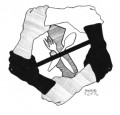Media and Tech
Design Matters: Social Media & Social Change
Technologies are not innocent. They embody human values. And the way we design them determines winners and losers among us, writes Asaf Bar-Tura. Here’s what you should be thinking about when you’re thinking about social change online.
Life and Action
To Help or Empower? Midwife at a Career Crossroads — Leftist Ethicist, September Edition
A white Jewish woman finishing up her certification as a nurse midwife wants to honor her commitment to racial and economic justice. And provide quality care to all women without compromising her commitment. Now what?
Arts and Culture
Art. Collaboration. Openness. Ritual. A “Sukkah Salon”
“In my art practice I’ve been frustrated by my discomfort with bringing my spiritual practice and identity into the objects I make,” artist Danielle Durchslag, co-creator of “Assembly Required: Sukkah Salon,” tells Zeek in this Q & A. “Somehow the two have stayed separate. This exhibition is an attempt to bridge those worlds.”
Life and Action
Handcuffs to Synagogue: A New Year, A Recommitment to Action
Tonight at Kol Nidre services, I will chant the prayer that absolves me from all oaths taken the previous year. The thing is — just yesterday I took an oath, alongside 119 women on a very hot day in the shadow of the US Capitol building, an oath that I (with the organization I represent, the National Council of Jewish Women) plan to keep. In part, we promised to:
create a House United for fair immigration reform, a House United through my family, my community and my place of work, a House United for justice and equality for all and especially for the women and children who make up three-quarters of all immigrants but whose needs are woefully ignored by our failed system.
And we put our bodies on the line to reinforce our commitment to this promise.
Faith and Practice
Kol Nidre and the Real Work of Personal Change
I begin each day of my life with a ritual. I wake up at 5:30 am, put on my workout clothes, my leg warmers, my sweatshirt and a hat. I walk outside my Manhattan home, hail a taxi, and tell the driver to take me to the Pumping Iron gym at 91st street and 1st avenue, where I work out for 2 hours. The ritual is not the stretching and weight training I put my body through each morning at the gym; the ritual is the cab. The moment I tell the driver where to go, I have completed the ritual. —Twyla Tharp, “The Creative Habit”
Why do we recite Kol Nidre on Yom Kippur night? The exact history of this prayer is a little vague, but what is clear is that this prayer is not a prayer at all: the Aramaic text, dating from at least the ninth century, is a legal formulation for the annulment of vows. It doesn’t mention the themes of the season: forgiveness, teshuva, renewal. It does not mention God. Unrelated in its content to the rest of the Yom Kippur liturgy, it seems at first blush to be a strange way to start a 25-hour period of intense introspection and self-reflection.
Part of Kol Nidre’s rhetorical power comes from its repetitive language: READ MORE
Life and Action
Welcoming the (Abortion-Seeking) Stranger: Reflections for a Season of Renewal
“This is Meredith,” the voice on the phone announced one afternoon in March. “We have someone who needs a place to stay for the night.”
I took a deep breath. It was the first time I’d gotten a call from the Haven Coalition since I’d signed up to volunteer. I ran my fingers through my hair as Meredith told me about Pearl: 25 years old, 20 weeks pregnant. She’d arrived in New York City from Buffalo and just finished the first part of a two-day abortion procedure. She would wait for me at the clinic on the Upper West Side.
News and Politics
Orange Is the New Black
We are in the Hebrew month of Elul, a time of review, return, and renewal leading to the High Holy Days. During Elul, we are asked to take stock of where and how we have fallen short, leading us to teshuvah, generally translated as “repentance” but really meaning “return.” Our “sins” serve as catalysts to return to our better selves, to God, and to Torah. This year, let us include among our shortcomings forgetting the humanity of those whom we have imprisoned and denying them the opportunity to do teshuvah.
Life and Action
The Leftist Ethicist, R-E-S-P-E-C-T (August Advice)
The Leftist Ethicist is an advice column for Zeek readers who envision a more just world and act to create it.
I have a guy friend that I haven’t seen for a few years. We used to be close, but from what I see on Facebook, he is now hardcore Orthodox. When we were in high school, we would hug and even cuddle on a couch. I’m a girl. Normally, when I see a friend I give them a hug or a kiss, but I don’t know what to do when I will see him at an upcoming reunion. I don’t want to treat him differently, but I want to respect him.
Faith and Practice
Praying With Our Lips: Another Side of Heschel’s Legacy
“Social justice activists of all religious and spiritual stripes,” writes Shuli Passow, “have something to learn from what Heschel understood as the power and practice of praying — not with one’s feet, but with one’s mouth, lips, and words.”
Faith and Practice
A Critical Time for Jewish Youth: Rethinking the Bar and Bat Mitzvah
Tweens need more. A look at one approach to making Judaism relevant, meaningful and transformative and giving youth a Jewish compass to navigate their lives ahead. Naturally.
![[the current issue of ZEEK]](../../image/2/100/0/5/uploads/leftistethicistgraphic-52842c6a.png)
- 5000 Pages of Zeek
- Founded in 2001, Zeek was the first Jewish online magazine, and we have over 5000 pages online to prove it, all available free of charge. Read more in the Archive.









